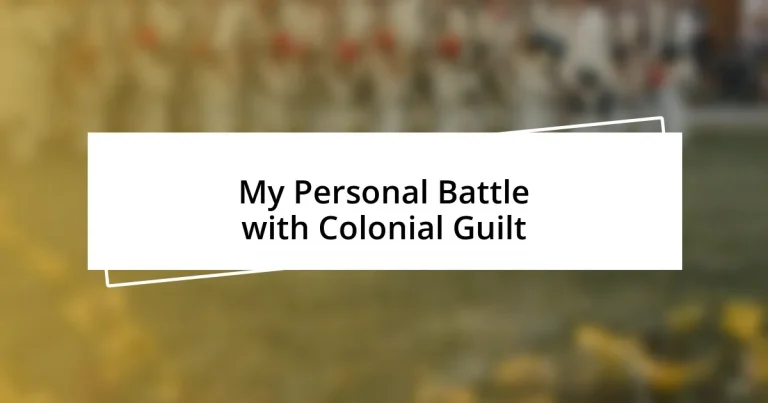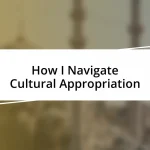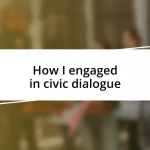Key takeaways:
- Colonial guilt drives emotional turmoil, prompting self-reflection and a sense of responsibility to confront historical injustices.
- Sharing experiences of colonial history fosters community and understanding, allowing for healing through collective dialogue.
- Recognizing privilege involves acknowledging the power dynamics in historical narratives and taking action to amplify marginalized voices.
- Taking constructive steps towards reconciliation includes community engagement, education, and forging relationships with affected communities.
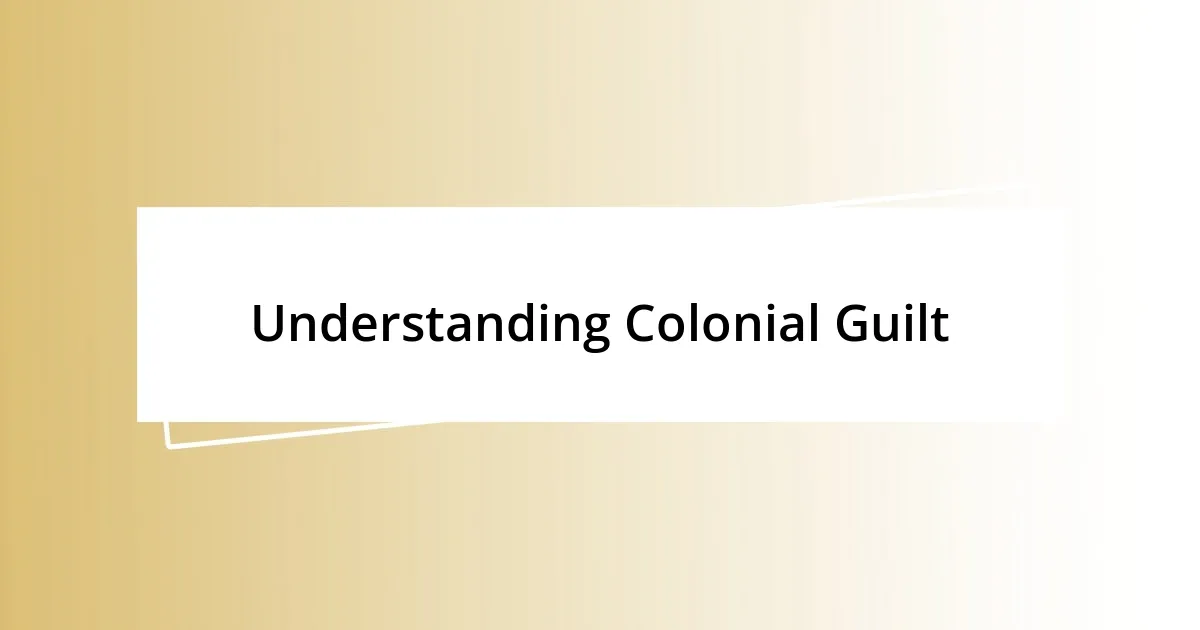
Understanding Colonial Guilt
Colonial guilt is a weighty phenomenon that sits heavily on the shoulders of those who recognize historical injustices. I remember the moment it hit me during a lecture on colonial history; I felt a mix of anger and helplessness as I realized how intertwined my own country’s prosperity was with the exploitation of others. This emotional turmoil can lead to profound self-reflection and, often, a sense of responsibility to make amends, but how do we even begin to address such a vast and complex legacy?
At times, I find myself grappling with the discomfort that arises from my privilege—privilege that is a direct result of colonial practices. It’s a strange place to exist, where you want to honor the past while also recognizing your present complicity. Have you ever wondered how to reconcile your identity with these historical injustices? These questions linger in my mind, probing for answers that often feel elusive.
Delving deeper, I’ve come to understand that colonial guilt isn’t just a personal burden; it’s a societal issue that demands collective engagement. It can spark meaningful conversations or lead to transformative actions when we allow ourselves to confront the shame of our history. In sharing these feelings of guilt with others, I’ve often found community and understanding—realizing that many share this journey and that perhaps, through dialogue, we can find healing together.
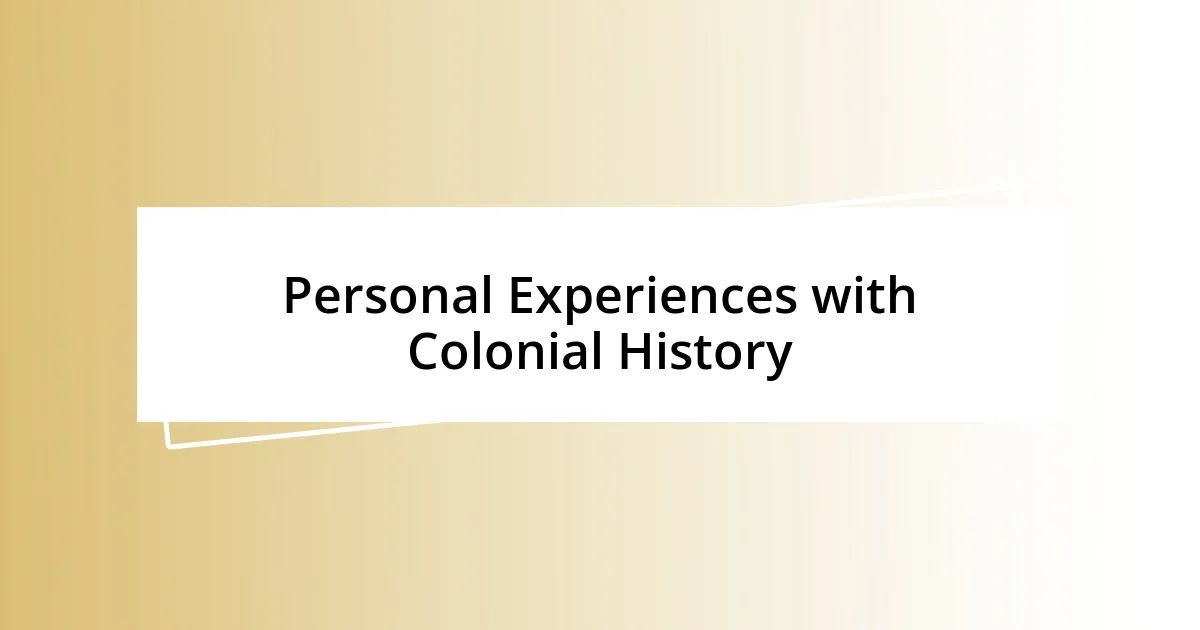
Personal Experiences with Colonial History
During my research on colonial history, a vivid memory surfaced from a family gathering. My grandfather—whose tales often painted a glorious picture of our familial heritage—mentioned his pride in our ancestors’ achievements. I couldn’t shake the feeling of discomfort. I felt compelled to question the narratives we cherish. I remember him sitting there, surprised at my sudden interrogation. In that moment, I realized how powerful stories can be, shaping our identity while, at times, masking uncomfortable truths.
- Engaging with historical texts often feels like peeling back layers of an onion—each layer revealing uncomfortable truths.
- I’ve participated in community workshops aimed at unpacking colonial histories, and it’s raw and powerful to witness shared emotions.
- The stories my family held dear often faced scrutiny, forcing me to reconsider the meaning behind our pride.
- This journey isn’t just about guilt; it can lead to profound moments of understanding and connection with others who feel similarly.
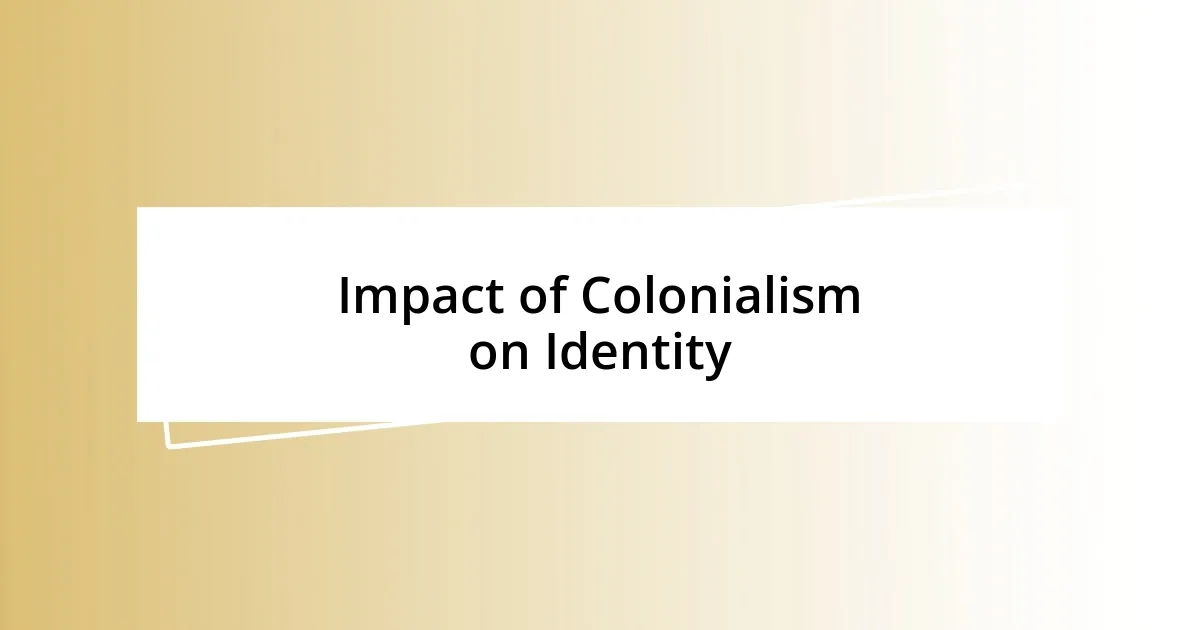
Impact of Colonialism on Identity
The legacy of colonialism complicates identity in profound ways. I often reflect on how my own sense of self has been shaped by the narratives around me. Growing up, I was always proud of my cultural heritage, but understanding colonial history made me question what that pride was built upon. It shifted from a sense of unchallenged loyalty to an awareness of the duality within my identity. Have you ever felt the pull between proud heritage and uncomfortable truths?
There’s a distinct sense of dislocation that comes from reconciling the history taught in schools with personal narratives. I remember a time in a group discussion where we unpacked our family histories, and I felt a deep sense of loss as we uncovered the stories of those who suffered under colonial rule. As I listened to others share their experiences, I realized that our identities are multi-faceted, woven together by both triumphs and tragedies. It’s fascinating how these stories can reshape our understanding of who we are and how we relate to one another.
The complexities of this identity shift often manifest in everyday life. I find it intriguing how the weight of colonial histories influences relationships and interactions in contemporary society. During a cultural event, I felt that familiar tension when discussing our ancestors’ roles in history. It made me appreciate the need for ongoing conversations about our past. These dialogues are essential in not just acknowledging our history, but also in nurturing a sense of community that honors the struggles while celebrating the resilience of those affected.
| Aspect | Precolonial Identity | Postcolonial Identity |
|---|---|---|
| Understanding | Rooted in cultural heritage | Shaped by historical narratives and guilt |
| Connection | Community solidarity | Awareness of colonial injustices |
| Emotional Experience | Pride in history | Complex feelings of guilt and pride |
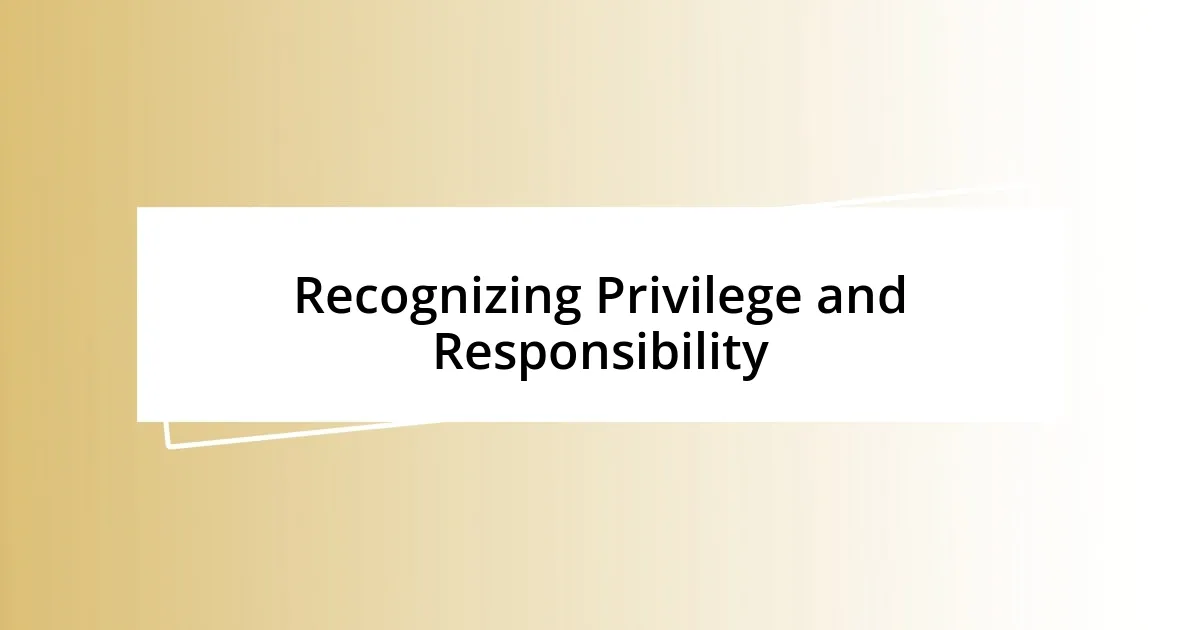
Recognizing Privilege and Responsibility
Recognizing privilege often starts with a moment of reflection. I remember sitting in a discussion circle when someone pointed out that privilege is not just about material wealth; it’s also about having the freedom to choose which aspects of history to acknowledge. That realization struck me deeply. How often do we choose to overlook the uncomfortable realities of our past just because they don’t align with our narrative?
With privilege comes responsibility. After attending workshops focused on deconstructing colonial narratives, I felt compelled to share what I learned with those around me. I remember explaining how privileged accounts often overshadow marginalized voices, and the room grew silent. In that moment, I realized that having a platform also means using it to amplify those who have been silenced. It’s a humbling experience, recognizing that my voice carries weight, and with it, I have the responsibility to foster understanding and empathy.
There was a time when I hesitated to confront my own privilege; it felt uncomfortable yet necessary. I recall a friend asking me, “What are you doing to make a difference?” It jolted me into action. The truth is, acknowledging privilege isn’t just about feeling guilt; it’s about transforming that awareness into meaningful action. What can we do today to honor the past while actively contributing to a more equitable future? That’s the challenge each of us faces.
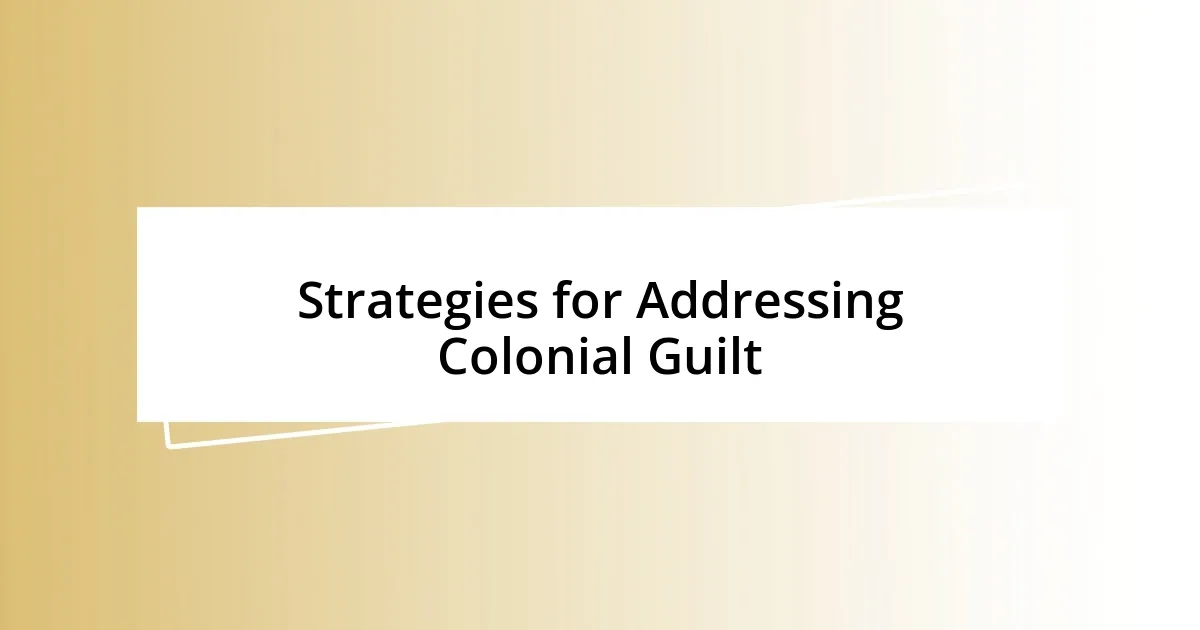
Strategies for Addressing Colonial Guilt
Addressing colonial guilt starts with personal reflection, which I find to be a powerful tool. I remember sitting on my balcony one evening, sipping tea and pondering what my ancestors endured. It struck me that recognizing my own feelings of guilt opens the door to a more honest dialogue about our histories. Have you ever let your thoughts wander, only to realize how much your personal story intersects with larger historical narratives?
Engaging with marginalized voices is another essential strategy. I once joined a community workshop where we read stories from those impacted by colonial legacies. Their powerful narratives stirred deep emotions within me—I found myself feeling not just guilt, but an urgency to act. Listening to others share their truths reminds me that our histories are not just abstract facts; they are woven into the fabric of our communities. It’s a humbling experience that pushes me to advocate for those whose stories deserve a wider audience.
Lastly, I’ve found that active participation in restorative practices can be incredibly grounding. After a particularly enlightening discussion on reparations, I sought out local initiatives that promote cultural preservation and education. Volunteering in such spaces gave me a sense of agency—a way to transform guilt into a constructive force. What would it look like if we all embraced such actions? I believe it would create ripples of change, helping us to not only acknowledge the past but also actively contribute to healing our present and future.
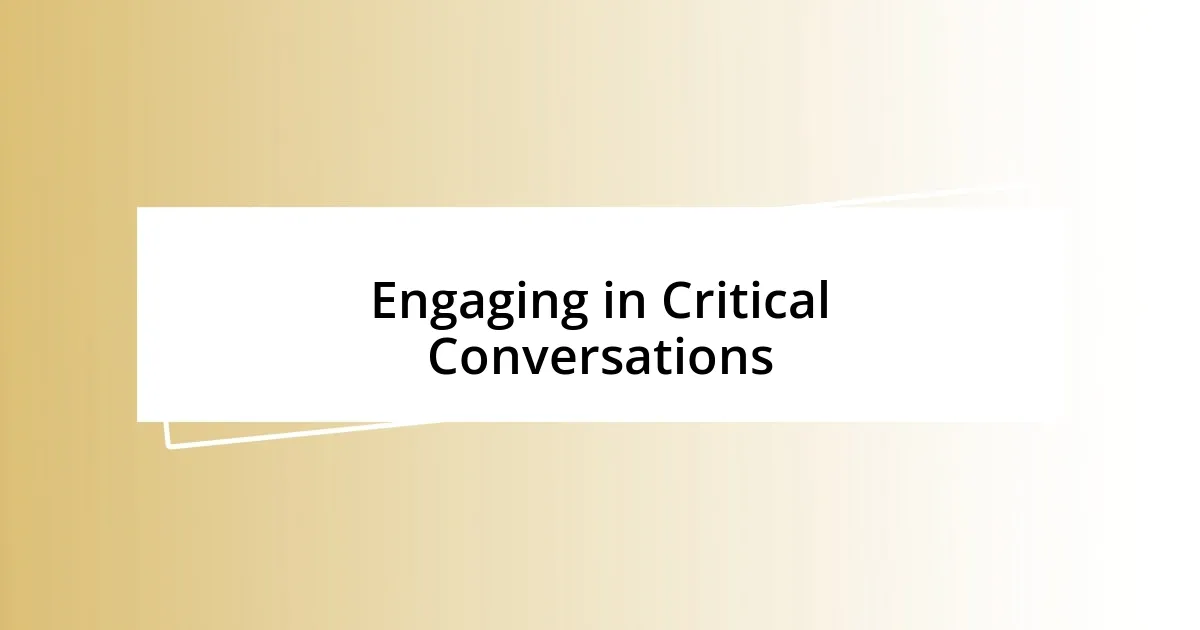
Engaging in Critical Conversations
Engaging in critical conversations is often the first step toward addressing colonial guilt. I remember sitting in a café with friends, where the topic shifted to our shared histories. I felt this palpable tension in the air—should we dare to dive into the uncomfortable truths about our past? I decided to take the plunge and initiated the conversation. The surprise on their faces turned into an engaged discussion, revealing that many of us had similar fears and misconceptions about our narratives. With small nudges, we unraveled the complexities that had been buried beneath polite conversation.
During these dialogues, I often find that vulnerability fosters connection. I once shared a personal experience where I attended a lecture on colonial impact and felt overwhelmed by the weight of historical injustices. A friend responded by sharing her grandmother’s stories of resilience. This openness shifted our dialogue from guilt to understanding. It’s moments like these that lead to deeper empathy and a collective commitment to learning together. Have you ever noticed how sharing personal stories can bridge gaps that seem insurmountable?
Moreover, the way we frame our conversations matters greatly. I discovered this truth during a community event focused on reparative justice—seeing the shift in tone as participants reframed their guilt into proactive discussion was transformative. Instead of lingering on blame, we concentrated on constructive paths forward. I felt a sense of liberation in identifying actionable steps we could all take, leaving the event not just with knowledge, but with a renewed purpose. How often do we let conversations spiral into despair rather than propel us into action? Embracing critical conversations can be an invitation to explore our shared responsibilities more deeply.
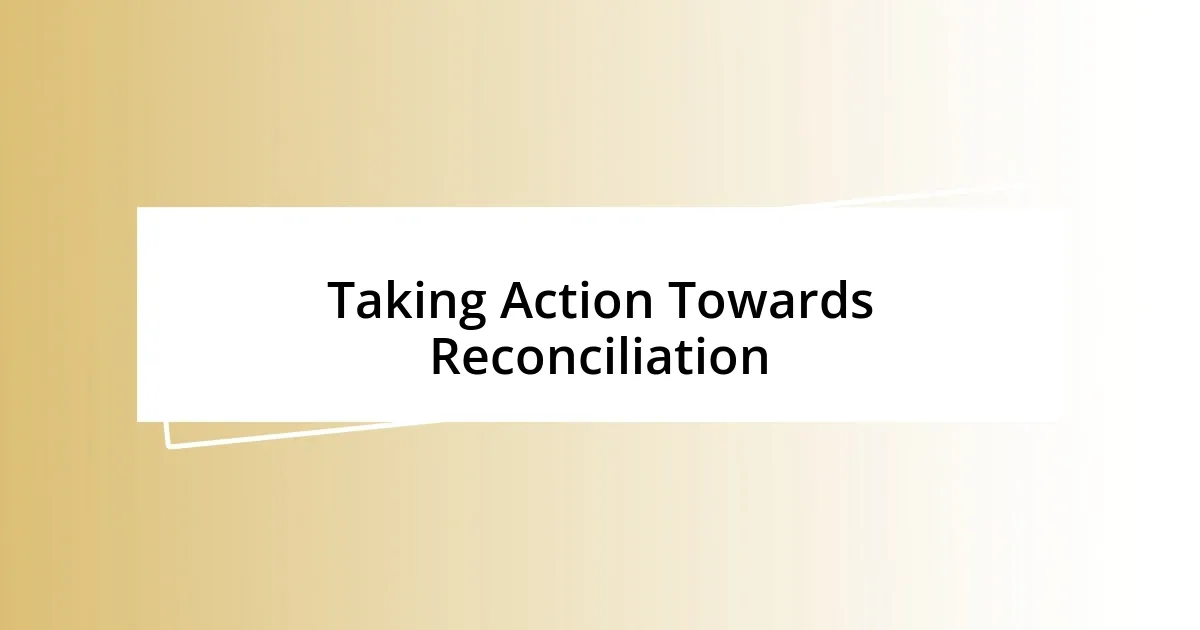
Taking Action Towards Reconciliation
Taking action towards reconciliation often starts by acknowledging the stories that history forgets. I remember volunteering at a local heritage event where I had the chance to connect with Indigenous artisans. Their passionate storytelling not only shed light on their experiences but also ignited my desire to support their work. It made me realize that reconciliation isn’t just a concept; it’s about forging genuine relationships and standing alongside affected communities. Have you ever experienced that electrifying moment when a simple conversation sparks a newfound commitment?
Participating in community activism is another avenue for transforming feelings of guilt into constructive action. I frequently found myself at rallies advocating for Indigenous rights, feeling a mix of anxiety and hope. My heart raced as I held a sign next to passionate allies who shared my commitment to change. Each chant and every shared story reaffirmed my belief that we are stronger together, and I could see the powerful impact we were making. What if we all recognized our power to influence change through collective action?
Finally, I’ve discovered the importance of education in this journey towards reconciliation. Diving deep into literature by Indigenous authors opened my eyes to the layers of colonial impact I had previously overlooked. I remember losing track of time as I read, each page illuminating a new perspective that challenged my preconceptions. Have you ever felt that rush of understanding that compels you to share what you’ve learned with others? It’s this ongoing learning that fuels my passion for change—it’s about creating a legacy where everyone feels seen and heard.












